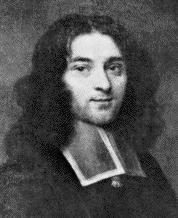Difference between revisions of "Bayle, Pierre (1647-1706)"
| [unchecked revision] | [unchecked revision] |
GameoAdmin (talk | contribs) (CSV import - 20130816) |
GameoAdmin (talk | contribs) (CSV import - 20130820) |
||
| Line 1: | Line 1: | ||
| − | + | [[File:Pierre_Bayle.jpg|300px|thumb|right|''Pierre Bayle. Source: | |
[http://en.wikipedia.org/wiki/File:Pierre_Bayle.jpg Wikipedia Commons] Wikipedia Commons | [http://en.wikipedia.org/wiki/File:Pierre_Bayle.jpg Wikipedia Commons] Wikipedia Commons | ||
'']] Pierre Bayle was born 18 November 1647 at Carla in southern [[France|France]], the son of a Reformed pastor. As a student in Toulouse, Bayle was persuaded to accept the Catholic faith, but in the next year (1670) returned to the Reformed Church. In 1681 he was made professor of philosophy in [[Rotterdam (Zuid-Holland, Netherlands)|Rotterdam]], where he died on 28 December 1706, having lost his position in 1693 because of his liberal views and supposed political intrigues. He stood for toleration on the ground that the state could have no jurisdiction in matters of faith, and found both the Catholics and the Reformed authorities opposed to him. His most important work, <em>Dictionnaire historique et critique </em>(1695 f.), contained a treatise on the [[Anabaptism|Anabaptists]]. It showed the current one-sided conception of the origin of the Anabaptists and their development. On the other hand, the unusually copious notes contained a great deal of interesting material important to our history | '']] Pierre Bayle was born 18 November 1647 at Carla in southern [[France|France]], the son of a Reformed pastor. As a student in Toulouse, Bayle was persuaded to accept the Catholic faith, but in the next year (1670) returned to the Reformed Church. In 1681 he was made professor of philosophy in [[Rotterdam (Zuid-Holland, Netherlands)|Rotterdam]], where he died on 28 December 1706, having lost his position in 1693 because of his liberal views and supposed political intrigues. He stood for toleration on the ground that the state could have no jurisdiction in matters of faith, and found both the Catholics and the Reformed authorities opposed to him. His most important work, <em>Dictionnaire historique et critique </em>(1695 f.), contained a treatise on the [[Anabaptism|Anabaptists]]. It showed the current one-sided conception of the origin of the Anabaptists and their development. On the other hand, the unusually copious notes contained a great deal of interesting material important to our history | ||
| − | |||
| − | |||
= Bibliography = | = Bibliography = | ||
Hege, Christian and Christian Neff. <em class="gameo_bibliography">Mennonitisches Lexikon</em>, 4 vols. Frankfurt & Weierhof: Hege; Karlsruhe; Schneider, 1913-1967: v. I, 147. | Hege, Christian and Christian Neff. <em class="gameo_bibliography">Mennonitisches Lexikon</em>, 4 vols. Frankfurt & Weierhof: Hege; Karlsruhe; Schneider, 1913-1967: v. I, 147. | ||
Visscher, H. and L. A. van Langeraad. <em>Het protestantsche vaderland: biographisch woordenboek van protestantsche godgeleerden in Nederland, </em>8 vols.<em> </em>Utrecht, 1903-1918: v. I, 356-359. | Visscher, H. and L. A. van Langeraad. <em>Het protestantsche vaderland: biographisch woordenboek van protestantsche godgeleerden in Nederland, </em>8 vols.<em> </em>Utrecht, 1903-1918: v. I, 356-359. | ||
| − | |||
| − | |||
{{GAMEO_footer|hp=Vol. 1, p. 253|date=1953|a1_last=Neff|a1_first=Christian|a2_last= |a2_first= }} | {{GAMEO_footer|hp=Vol. 1, p. 253|date=1953|a1_last=Neff|a1_first=Christian|a2_last= |a2_first= }} | ||
Revision as of 18:46, 20 August 2013

Pierre Bayle was born 18 November 1647 at Carla in southern France, the son of a Reformed pastor. As a student in Toulouse, Bayle was persuaded to accept the Catholic faith, but in the next year (1670) returned to the Reformed Church. In 1681 he was made professor of philosophy in Rotterdam, where he died on 28 December 1706, having lost his position in 1693 because of his liberal views and supposed political intrigues. He stood for toleration on the ground that the state could have no jurisdiction in matters of faith, and found both the Catholics and the Reformed authorities opposed to him. His most important work, Dictionnaire historique et critique (1695 f.), contained a treatise on the Anabaptists. It showed the current one-sided conception of the origin of the Anabaptists and their development. On the other hand, the unusually copious notes contained a great deal of interesting material important to our history
Bibliography
Hege, Christian and Christian Neff. Mennonitisches Lexikon, 4 vols. Frankfurt & Weierhof: Hege; Karlsruhe; Schneider, 1913-1967: v. I, 147.
Visscher, H. and L. A. van Langeraad. Het protestantsche vaderland: biographisch woordenboek van protestantsche godgeleerden in Nederland, 8 vols. Utrecht, 1903-1918: v. I, 356-359.
| Author(s) | Christian Neff |
|---|---|
| Date Published | 1953 |
Cite This Article
MLA style
Neff, Christian. "Bayle, Pierre (1647-1706)." Global Anabaptist Mennonite Encyclopedia Online. 1953. Web. 20 Apr 2024. https://gameo.org/index.php?title=Bayle,_Pierre_(1647-1706)&oldid=75253.
APA style
Neff, Christian. (1953). Bayle, Pierre (1647-1706). Global Anabaptist Mennonite Encyclopedia Online. Retrieved 20 April 2024, from https://gameo.org/index.php?title=Bayle,_Pierre_(1647-1706)&oldid=75253.
Adapted by permission of Herald Press, Harrisonburg, Virginia, from Mennonite Encyclopedia, Vol. 1, p. 253. All rights reserved.
©1996-2024 by the Global Anabaptist Mennonite Encyclopedia Online. All rights reserved.
